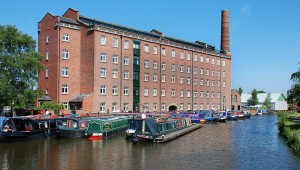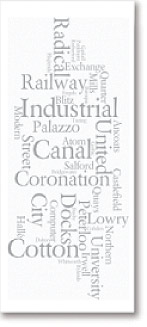Next tours: 2019.
Meet: Macclesfield station, time tbc.
 Leave the Mancunian mills behind to meet the “Maxonians” in the only mill town that wasn’t bombed during WWII.
Leave the Mancunian mills behind to meet the “Maxonians” in the only mill town that wasn’t bombed during WWII.
With three former Roman roads meeting nearby, “Silk town” (or “Treacle town” as it is also known) has long been a major trading post between the Pennine Hills and the communities scattered across the Cheshire plain.
After becoming a Royal Manor in 1068, Macc was included in the Domesday book. Edward I made the town a borough in 1261, building a country retreat in MacclesfieldForest to visit with his wife Eleanor, who founded St Michael’s Parish church in 1278. During the 14th Century Edward the Black Prince bred horses here for the French wars and chose local longbowmen, renowned as some of the finest in England.
Macclesfield has welcomed many more famous people over the years and we will hear of more of these on our walk around the town. A notable former resident was John Brownswerde, who left Stratford-upon-Avon to become Headmaster at Macclesfield’s FreeGrammar School (founded in 1502). Educated at both Oxford and Cambridge universities, Brownswerde was a renowned schoolmaster with a singular method of teaching, being known by most men that knew him as “Grammaticus”. A brass memorial dedicated to him by the ex-pupil and Elizabethan poet and playwright, Thomas Newton, can be found in Macclesfield parish church with the words: “The first of poets, the leader of grammarians and the flower of schoolmasters.”
Stratford vicar Sir John Bretchgirdle (formerly of nearby Northwich in Cheshire) sent his star pupil, the young William Shakespeare, to Macclesfield to study under his good friend, John Brownswerde. This would have been where William shaped his use of language and gained an unusual knowledge of law and its procedures. At that time, one of the specialities of the school was teaching law as the basis for a career in the profession. Shakespeare had almost total recall of Ralph Holinshead’s Chronicles of England, Scotland and Wales, considered to be the most definitive history book of the time. At least fourteen of his plays are said to have their origin in this book, some even including the exact wording.
Holinshed was born in the village of Sutton, two miles down the road, so he was probably an ex-scholar of the Free Grammar school. Having been written by a local man, the book must have been required reading for the pupils. When Brownswerde became ill, Shakespeare probably took over teaching duties, then on the headmaster’s retirement in 1588, William is known to have moved to London, where he gained his reputation.
To discover more stories of Treacletown, join us at Macclesfield railway station for a walk around the town centre, finishing in the “Treacle Market” in front of the parish church.

